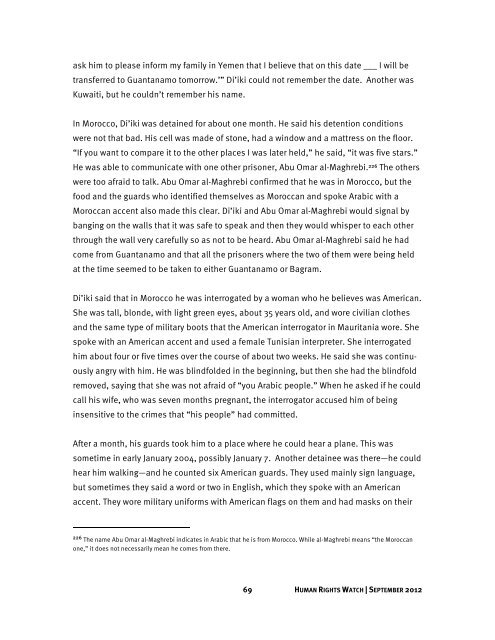Delivered Into Enemy Hands - Human Rights Watch
Delivered Into Enemy Hands - Human Rights Watch
Delivered Into Enemy Hands - Human Rights Watch
Create successful ePaper yourself
Turn your PDF publications into a flip-book with our unique Google optimized e-Paper software.
ask him to please inform my family in Yemen that I believe that on this date ___ I will be<br />
transferred to Guantanamo tomorrow.’” Di’iki could not remember the date. Another was<br />
Kuwaiti, but he couldn’t remember his name.<br />
In Morocco, Di’iki was detained for about one month. He said his detention conditions<br />
were not that bad. His cell was made of stone, had a window and a mattress on the floor.<br />
“If you want to compare it to the other places I was later held,” he said, “it was five stars.”<br />
He was able to communicate with one other prisoner, Abu Omar al-Maghrebi. 226 The others<br />
were too afraid to talk. Abu Omar al-Maghrebi confirmed that he was in Morocco, but the<br />
food and the guards who identified themselves as Moroccan and spoke Arabic with a<br />
Moroccan accent also made this clear. Di’iki and Abu Omar al-Maghrebi would signal by<br />
banging on the walls that it was safe to speak and then they would whisper to each other<br />
through the wall very carefully so as not to be heard. Abu Omar al-Maghrebi said he had<br />
come from Guantanamo and that all the prisoners where the two of them were being held<br />
at the time seemed to be taken to either Guantanamo or Bagram.<br />
Di’iki said that in Morocco he was interrogated by a woman who he believes was American.<br />
She was tall, blonde, with light green eyes, about 35 years old, and wore civilian clothes<br />
and the same type of military boots that the American interrogator in Mauritania wore. She<br />
spoke with an American accent and used a female Tunisian interpreter. She interrogated<br />
him about four or five times over the course of about two weeks. He said she was continuously<br />
angry with him. He was blindfolded in the beginning, but then she had the blindfold<br />
removed, saying that she was not afraid of “you Arabic people.” When he asked if he could<br />
call his wife, who was seven months pregnant, the interrogator accused him of being<br />
insensitive to the crimes that “his people” had committed.<br />
After a month, his guards took him to a place where he could hear a plane. This was<br />
sometime in early January 2004, possibly January 7. Another detainee was there—he could<br />
hear him walking—and he counted six American guards. They used mainly sign language,<br />
but sometimes they said a word or two in English, which they spoke with an American<br />
accent. They wore military uniforms with American flags on them and had masks on their<br />
226 The name Abu Omar al-Maghrebi indicates in Arabic that he is from Morocco. While al-Maghrebi means “the Moroccan<br />
one,” it does not necessarily mean he comes from there.<br />
69 HUMAN RIGHTS WATCH | SEPTEMBER 2012
















